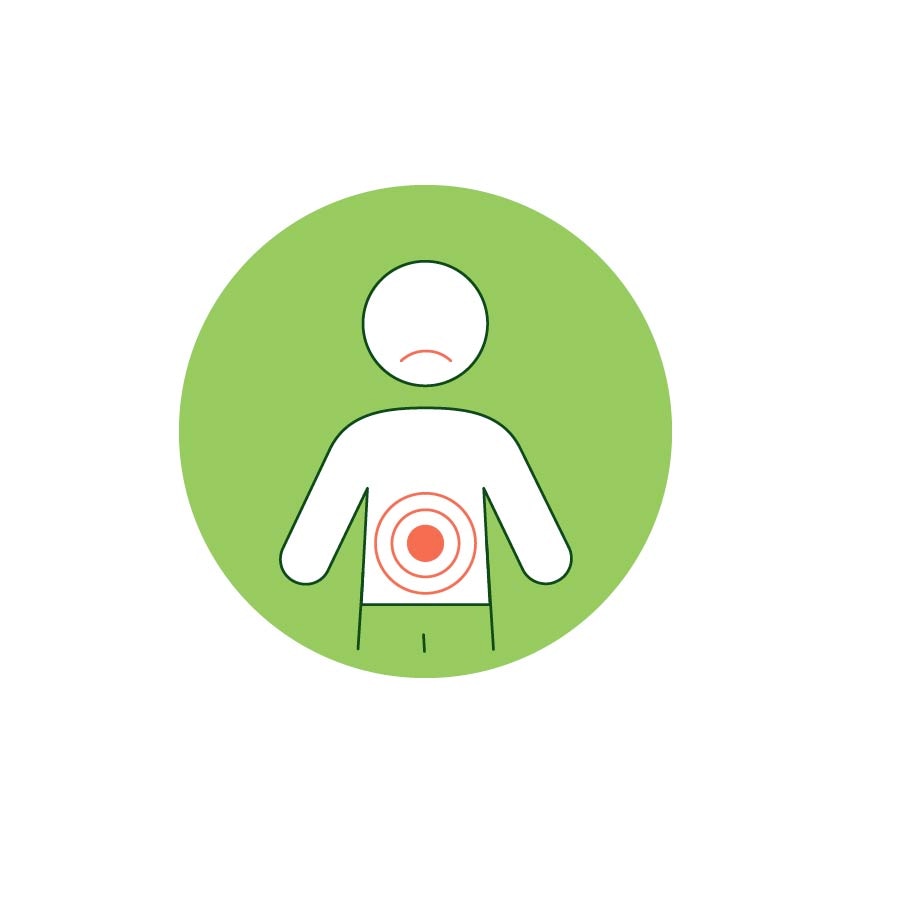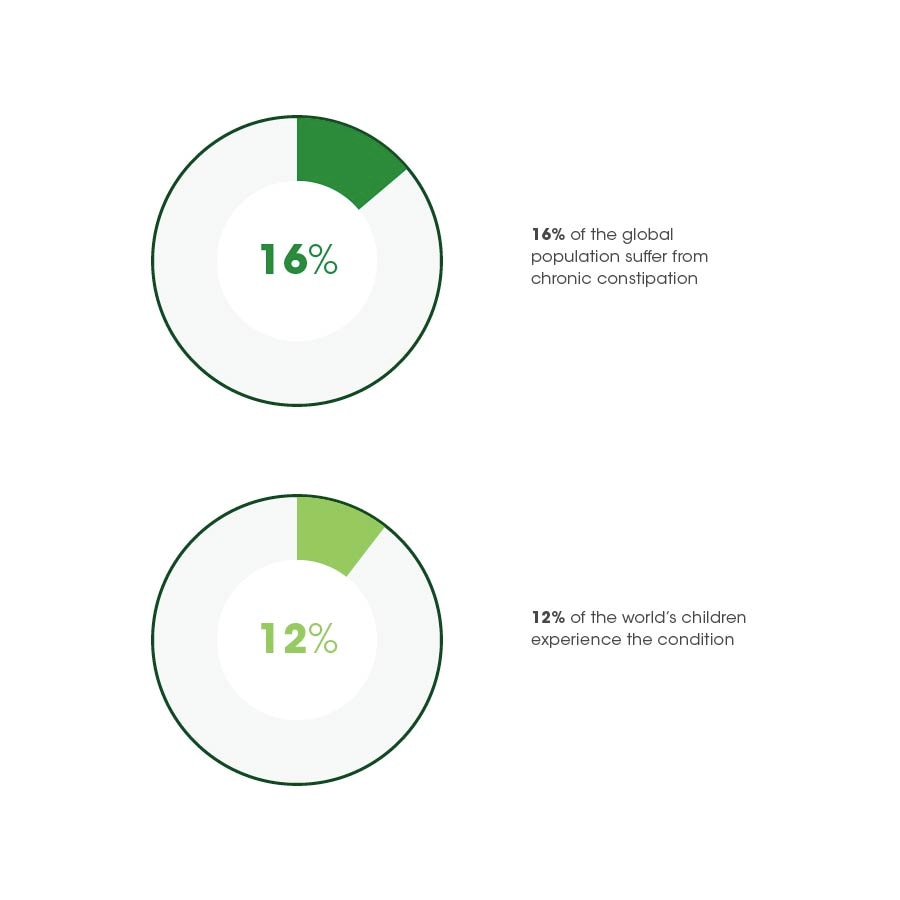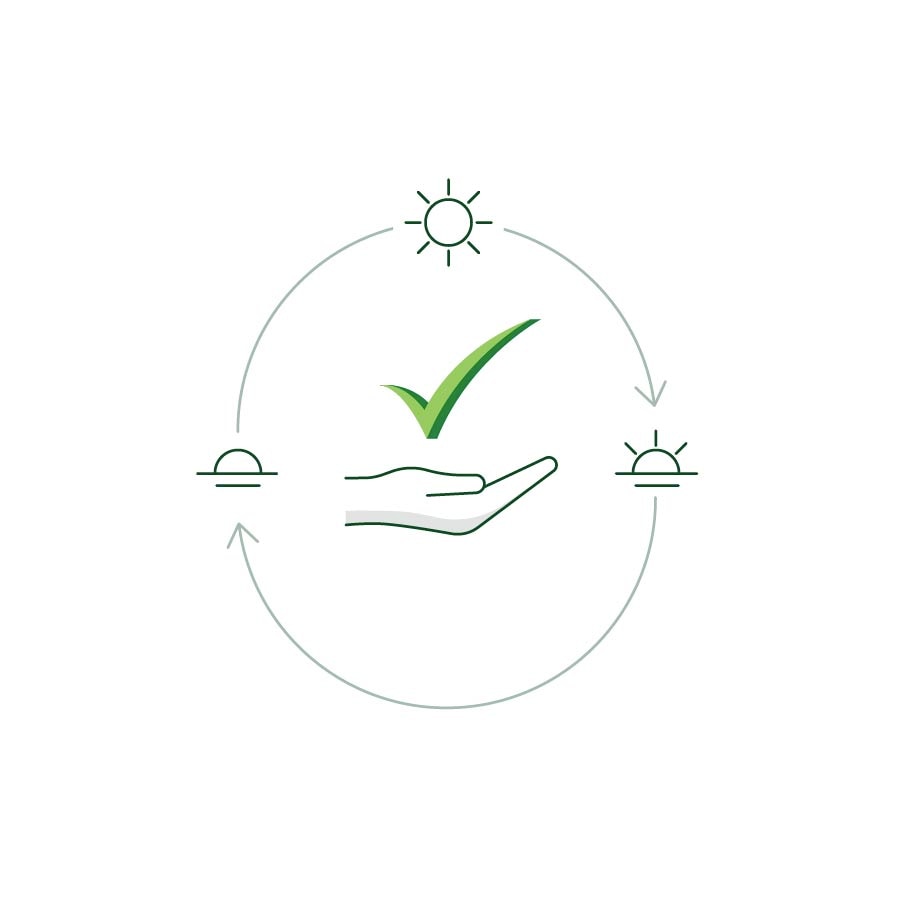About constipation
What are the symptoms of constipation?
• Hard stools
• Infrequent bowel movements
• Excessive straining
• Abdominal bloating
• Feeling of incomplete evacuation
• Use of digital manoeuvres for evacuation of stool

Constipation – key figures

Constipation – key figures
Who is most at risk?
Women: studies suggest that 72% of women report suffering from constipation, and that women are twice as likely as men to experience it.
Children: worldwide, it is estimated that between 10% and 35% of children experience constipation and children living in poverty have higher risk.
Elderly people: our likelihood of experiencing constipation increases as we age, and studies suggest that the risk is up to five times higher for older people.
Why are we constipated?
Why are we constipated?
Lack of physical exercise
Do you know that physical activity facilitates bowel movements? Even thirty minutes of exercise per day is enough to make a difference – not just to your digestion but to every aspect of your health. Plus, it keeps you fit!
Travel and/or changes to your daily routine or diet
Occasional constipation can also occur when there’s a drastic change in what you eat. This could happen if you travel to a foreign country, for example. Flying can also increase your risk of constipation because it involves sitting still for long periods of time.
Lack of fibre intake
Fibre is important for our digestion because it improves our gut health and increases the speed at which food passes through our bodies. Good sources of fibre include fruit, vegetables, wholegrain foods, pulses and more.
Pregnancy
The hormonal changes women experience during pregnancy slow the passage of food through the body and sharply increase their likelihood of experiencing constipation. The condition is estimated to affect up to half of all pregnancies worldwide.
Inadequate fluid intake
Drinking plenty of water is vital for many of our bodily functions, and digestion is no exception. Staying hydrated by drinking at least 1.5 litres of water per day is important because it helps to prevent faeces from becoming dry and difficult to pass.
Ignoring the urge to defecate
Do you avoid defecating when you’re not at home? Holding it for too long and too often can slow down your digestion. Don’t wait, go!
Taking certain types of medication
Constipation as a side effect of a wide array of prescription medications. Ironically, laxatives can also lead to constipation when taken too frequently because they cause dehydration.
Stress and anxiety
Daily stress can affect the digestive system and people who are stressed are more likely to experience the condition. Remember, you need to be relaxed to facilitate regular bowel movements.
Digestive diseases and conditions
Other conditions such as IBS (Irritable Bowel Syndrome) can cause constipation.

Factors to consider

How to prevent and treat constipation
Eat plenty of fibre
The food we eat is a major determining factor for our digestion. Eating too much of the wrong foods or not enough of the right types is a common cause of a wide array of health issues. When it comes to constipation, dietary fibre is crucial. Key sources of fibre include wholegrain foods such as brown rice, bread and pasta, fruit and vegetables, pulses, nuts and seeds. These improve our digestion because they increase the speed at which food is pushed through our system by the muscles in our gut and reduce the risk of faeces becoming dry and hard to pass. That’s why increasing our dietary fibre and fluid intake is recommended by healthcare professionals as the first treatment we should try when we experience constipation. Fibre supplements such as OptiFibre are recommended for people whose daily fibre needs cannot be met through dietary changes alone.
Increase your fluid intake
We all know that drinking plenty of water is good for our bodies, but many of us fall short of the recommended daily fluid intake. Do you drink 1.5 litres of water every day? If so, the good news is that drinking 2 or even 3 litres is even better for you! When combined with an adequate level of dietary fibre, good hydration can help to prevent constipation.
Ensure that you have the right posture
Did you know that sitting in the right position can help to open the bowel, reduce straining and prevent constipation? Many of us in the West aren’t sitting in the optimal position because of the way in which our toilets are designed. If you’re suffering from constipation, try using a stool to raise the level of your feet.
Increase your levels of physical activity
Many of us live quite sedentary lives that increase the risk that we will experience constipation. Try to find a type of exercise that you enjoy (whether that’s walking, running, cycling or something else entirely) and build it into your daily routine.
Relax
We know it’s easier said than done, but try to avoid too much stress. The best time to use the toilet is the morning. To prepare yourself, massage your belly with the palm of your hand, using a circular, clockwise motion.
Trust nature
Prescription medications aren’t the best solution for every problem. Ensure you’re eating healthy food, such as fibre based solutions.



